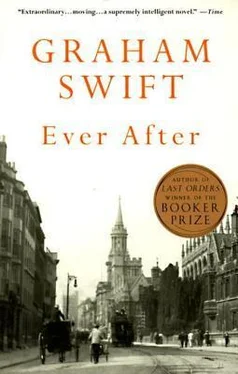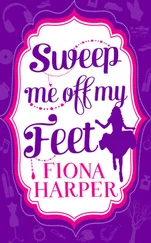I should have protested. I should have said, at least, about those photographs: take them from the dining-room, if you will, but let me keep them in my bedroom. But the hypocrite and the coward in me stopped my tongue.
They got married the following March. There was a decent interval in which she practised being a widow and Sam, to give him his credit, kept his relative distance, turning up only for plainly licentious weekends. It’s true, he had much to occupy him. He was sowing (also) the seeds of his little empire — spreading the bright new gospel of polymers. I still have a vision of him offering his New World marvels to a depressed and war-wrecked England. The picture merges with all those smiling GIs, in their jaunty jeeps, handing out gum and being kissed and garlanded in the ruins of liberated villages. This was not Sam’s experience, but he was built in the appropriate mould, and perhaps even imagined himself in the same blithely triumphal role.
Unlike many of his countrymen hustling their way round Europe in those days, Sam did not simply have a suitcase full of nylons, he had a father in Cleveland with a factory that made nylons and, young as he was, a sound working knowledge of industrial chemistry. Above all, he had an inborn flair for business. I think of Sam as a perpetual juvenile in all other respects, but in business he had powers beyond his years.
Of the origin of the flair, of Sam’s parentage, of “old man Ellison,” clearly one of America’s leading plastics pioneers, I know very little; only that he and Sam had had a falling out, the roots of which seemed to have been the old man’s egotism and Ed’s death. There was Ellison senior, the self-made tycoon, and there was Ed at the bottom of the ocean. And in between the two was Sam, the dutiful, filial protégé, the safe, underwritten, overshadowed, guilt-ridden schmuck. Sam had to go his own way or become the eternal stooge. The necessary scenes of confrontation and rebellion should have prepared him, you might think, for my own act of rebellion in flatly refusing (I could see it coming a mile off) his own bountiful offer of a life in plastic. He might have been mercifully inclined, even nostalgically respectful. Not a bit of it. There was not even what I took to be old Ellison’s final compromise: a sizeable pay-off and the injunction to get lost and get rich.
Like father, like son. I wonder. In going his own way, you could say Sam only did in reverse what his own father had done some decades before when he upped sticks and crossed the promise-laden Atlantic. Sam pitched his hopes in the opposite direction, in an old continent which history had nonetheless turned into a new wilderness, where opportunities abounded for the bold and the resourceful and where it was still possible, in such callings as plastics, to be a pioneer. Thus he partook of that post-war spirit of inverse colonialism which beguiled and affronted the exhausted folk of the old world — yet which, in Sam’s case, was to be reversed yet again, to melt in that grotesque dream of actual assimilation, actual assumption into the true, old world.
But the release from paternal oppression also gave the perpetual kid-at-heart within Sam its liberty. Thus it was that, with a view to a little holiday, a little sight-seeing before the serious business of life began (and with Ed’s robbed youth as well as his own to think of), Sam came to Paris.
It seems to me now that, but for my father’s extreme action, my mother might have been for Sam only a ship that passed in the night. He was too soft-centred a soul simply to run away from the mess, and he found himself caught. But this is only one interpretation, and it begs the question of who was the predator and who (or what) was the prey. There was the factor of my mother’s (i.e., my father’s) money, which would indubitably have come in handy for a young man pledged to an independent life, let alone to setting up his own business. However big the cut he received from old Ellison, Sam must have been running through it fast enough in Paris. My father died; Sam saw his opportunity. It would, of course, be interesting to know whether he saw his opportunity before my father died.
Then there was the factor (I cannot overlook this — I heard the squeals from the bedroom) of sheer carnal compulsion. They hit it off. I have to say it. Sam brought to a yielding ripeness the full fruits of my mother’s womanhood, poorly tended as perhaps they were by my father. Perhaps because of his obligation to function for two, Sam was on some sort of biological overdrive. But — I have to say this too — my mother could give as good as she took. And in all this she was not blind. Sam was the blind one, at least when his eyes (I only quote an expression he once used, with rare self-appraisal, of himself) were only in his balls. I think she took stock of her precarious seniority. She gave herself an interval of fleshly fulfillment, during which time she would set Sam up (the question still stands: how much was Ellison Plastics my mother’s work?), and thus enjoy, in her mellower years, with a little diplomatic flexibility (the biological overdrive was an ongoing thing), both the rewards and the control.
An image of Sam, indelible in the memory, from one of those weekends during our first months back in England. A sultry summer’s night; I get up to fetch a glass of water: Sam on the landing, stark naked, caught between bedroom and bathroom, and in a state of livid tumescence. He drops a hand in almost maidenly alarm. He says, “Oh, hi, Billy,” with a kind of strangulated nonchalance, as if we have met on some street corner. Never thereafter is the encounter mentioned by either of us.
And he would have died, so it seems, “in action,” in mid-erection, even in mid—
Sam, Sam. Led by his prick to his perdition. Switched off but still plugged in. Mr Plastic. Mr Plastic?
Only when the image of my ballet girls faded did grief for my father emerge to take its place. Or rather, not grief itself (what did I know then about grief?), but a nagging, self-pitying, self-accusing emotion born of the guilt at not feeling grief (how could I sigh over young sylphs in tutus when my own father was dead?) and out of a mood of redundancy, which it occurred to me my father must have felt too. There were Sam and my mother testing the springs of a new double bed, and there was I, an adjunct, an accessory, a supernumerary. This had been my father’s position. I stood in his vacant place. And out of this ghostly identification I began to summon a father I had never really known: noble, virtuous, wronged.
I’d like to think I wasn’t as slow as I was in opening my account of vengeance; that at least by that day the India photos were removed, I had taken my first vow of retribution; and that if I took such a vow, it was as authentic and spontaneous as the pang that prompted it. But I’m not so sure. I’m not so sure if our passions seek out models of behaviour or if models of behaviour are the springs of our passions. It was a while before the first blow was struck.
When I was eleven I went to a new school. I expected to excel in French. Instead, I excelled in English; I took comfort in books. I’d like to think that the love of literature which fell into my life around this time, and which one day would embolden me to snub Sam’s patrimony of plastic, was a pure and genuine love, lighting my darkened and orphaned days. But I cannot be sure. I cannot be sure which came first: the love of literature, which ensured I would cherish the play; or the play, which guaranteed I would venerate literature. In any case, my English master, as you know, was Tubby Baxter: a thin and cadaverous man, naturally, thus having the air now and then of a haunted and death-obsessed Renaissance hero. And the play, which you might have guessed if I hadn’t already told you, was Hamlet .
Читать дальше












